|
|
|
Sort Order |
|
|
|
Items / Page
|
|
|
|
|
|
|
| Srl | Item |
| 1 |
ID:
179014


|
|
|
|
|
| Summary/Abstract |
This study investigates the perceptions of the local female population towards displaced Syrians in Turkey. The research is based on the analysis of data from participant observation and discourse analysis of conversations in five ‘gün’ groups, which are informal, social, and fairly regular gatherings of local women, in Mersin in Spring 2018. Five common discursive patterns are identified: stereotyping, biased perceptions, ‘us’ vs. ‘them’, scapegoating, and discrimination. We conclude that local women’s discourses reveal marginalisation and discursive exclusion of displaced Syrians in Turkey, and argue that such othering originates not only from existing cultural differences, language barriers, and lack of trust, but also from lack of sustained social interaction between these groups. Further studies should facilitate both knowledge sharing about the additional vulnerabilities such attitudes create for displaced people and potential paths for meaningful engagement between local community members and forcibly displaced people.
|
|
|
|
|
|
|
|
|
|
|
|
|
|
|
|
| 2 |
ID:
180002
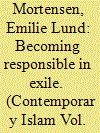

|
|
|
|
|
| Summary/Abstract |
Taking an ethnographic point of departure in the stories of three Syrian middle-class men in Amman, Jordan, in this article, I zoom in on the role of care in the everyday of exile, as I explore the young men’s attempts to be “responsible” young men despite challenging circumstances. Guided by Ahmed’s (2006) notion of lifelines, defined as those which direct us and allow us to find our way (ibid.: 12–14), I demonstrate how gendered norms and notions became objects of reflection and experimentation in exile, both enabling and forcing the young men I worked with to think through other ways of leading life as a man. Finding further inspiration in Naguib’s (2015) and Ghannam’s (2013) works on masculinity and care in the Middle East, I consider care as central to the process of negotiating a masculine identity in general as well as to the reconfiguration of a meaningful masculine position in exile specifically.
|
|
|
|
|
|
|
|
|
|
|
|
|
|
|
|
| 3 |
ID:
125291
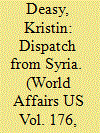

|
|
|
|
|
| Publication |
2013.
|
| Summary/Abstract |
ATMEH, Syria - A sprawling tent city has sprouted up here amid the sand-flecked hills and ancient olive groves. Giant tarps twist up into the branches as rivulets of contaminated water run below. A tank watches from down the road, which leads to the nearby Turkish border.
|
|
|
|
|
|
|
|
|
|
|
|
|
|
|
|
| 4 |
ID:
157500
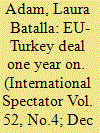

|
|
|
|
|
| Summary/Abstract |
Now in its sixth year, the war in Syria has triggered the largest humanitarian and refugee crisis of our time. For most refugees and migrants, Turkey is the main transit country to reach Europe, where Syrian refugees hope for a better future. However, this journey has been hampered as several European countries closed their borders following the arrival of an unprecedented number of migrants and asylum seekers in 2015. In response, a deal was struck with Turkey to stem the migrant flow to Europe in exchange for some concessions. By outsourcing the management of migration flows to Turkey, the EU is failing to take its fair share of responsibility for refugee protection. Furthermore, as a result of the political situation in Turkey and the unmet promises under the deal, relations between Turkey and the EU have touched their lowest point since the start of accession negotiations in 2005. While survival of the deal is of critical importance as the EU needs Turkey’s assistance in curbing migration flows and Turkey is keen on revitalising its accession negotiations, the deal has exposed serious flaws that need to be addressed and must not be replicated with other countries.
|
|
|
|
|
|
|
|
|
|
|
|
|
|
|
|
| 5 |
ID:
165218
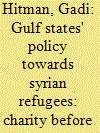

|
|
|
|
|
| Summary/Abstract |
The regional turmoil in the Middle East since December 2010 has provided researchers with many topics for research. Despite a relatively large number of studies in recent years, none of them deal with one of the central questions – namely, the attitude of the Gulf States toward the misery of the Syrian refugees. While more than six million Syrians fled their homeland and became refugees, 1.5 million in Europe, few, if any, succeeded in relocating to the Gulf States.
|
|
|
|
|
|
|
|
|
|
|
|
|
|
|
|
| 6 |
ID:
138556
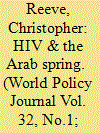

|
|
|
|
|
| Summary/Abstract |
CAIRO—Mona Iraqi, an outspoken filmmaker turned television presenter, goes in for the kill. She had been staking out a Cairo bathhouse for some time. A hidden camera had recorded enough damning evidence to condemn the place. And now it’s time for action. Iraqi and a cameraman join Egyptian security forces as they raid the hammam. Dozens of bare-chested men, hands covering their faces, are herded out of the place while Iraqi and her crew record the sting operation’s climax for her show, “El-Mestakhabi” (“The Hidden”).
|
|
|
|
|
|
|
|
|
|
|
|
|
|
|
|
| 7 |
ID:
190684


|
|
|
|
|
| Summary/Abstract |
In the last several years, the AKP government in Turkey has granted exceptional citizenship to more than 200,000 Syrian refugees and 19,000 foreign investors, mostly from the Middle East. This study defines the AKP’s recent policy of granting exceptional citizenship as an illiberal inclusion, which is a mode of neoliberal and particularistic inclusion without extending the eligibility and rights of regular migrants and refugees. By means of exceptional citizenship, the AKP transforms the politics of granting particularistic access to Turkish citizenship, from one characterized by an ethno-religious inclusion towards another defined by more explicit religious inclusion entangled with its neo-Ottomanist domestic and foreign policy goals. The study also suggests that the current state of granting exceptional citizenship is intermingled with the AKP’s authoritarian neoliberalism, and the structural centralization of executive power under the current presidential system.
|
|
|
|
|
|
|
|
|
|
|
|
|
|
|
|
| 8 |
ID:
143130
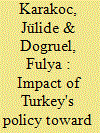

|
|
|
|
|
| Summary/Abstract |
Turkey's changing policy toward Syria since the start of the Syrian uprisings in March 2011 has had major cultural, economic, social, and political implications for the people of the city of Hatay, which is located on the Turkey-Syria border and is home to people of diverse ethnicities and religions. This article explores how the problematic relations between Syria and Turkey following the uprisings in Syria have shaped perceptions of human security, examining in particular the impact of the discourse used and the policies followed by Turkey during the civil war in Syria on the security perceptions of the people of Hatay. It is suggested that Turkey's policy toward Syria and the resulting social, economic, and political repercussions for Hatay have fueled perceptions of insecurity for both Syrian refugees and the residents of the city.
|
|
|
|
|
|
|
|
|
|
|
|
|
|
|
|
| 9 |
ID:
144280
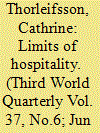

|
|
|
|
|
| Summary/Abstract |
Based on qualitative fieldwork in the Sunni village of Bebnine, located between Tripoli and the northern Syrian border, this paper explores how displaced Syrians adjust to life in Lebanon under the threat and actuality of violence. The marginalised refugees do not only appear as passive victims of crisis but draw on a diverse repertoire of coping strategies to deal with displacement and dispossession. Self-settled Syrians have exploited social networks, savings, aid, education and work opportunities to create a new livelihood system for themselves. Nevertheless, everyday life in Lebanon is not conceptualised as a safe zone. Syrian refugees are increasingly being used as scapegoats for the poor economy and political challenges in the country. While practices of hospitality towards the Syrian refugees were widespread, ambivalent feelings and prejudice frequently surfaced. Refugees expressed concern that the Syrian civil war would escalate into further sectarian violence in Lebanon, pushing the country closer to war.
|
|
|
|
|
|
|
|
|
|
|
|
|
|
|
|
| 10 |
ID:
165377


|
|
|
|
|
| Summary/Abstract |
Refugee response planners no longer frame Syrian refugees merely as objects of humanitarian care. Increasingly they are portrayed as enterprising subjects, whose formal integration into labor markets simultaneously can create self-sufficient actors and cure the economic woes of host countries. However, bringing together humanitarian and economic agendas is not an easy task. This article analyzes the contradictions and frictions that have emerged in the process of implementing the Jordan Compact, a political commitment to integrate Syrian refugees into the formal Jordanian labor market, and which is supposed to showcase such win-win strategies. It argues that the Jordan Compact should be seen as a policy model that has achieved enough consensus and incorporated enough disparate objectives to be labelled a ‘policy success.’ Yet, central actors have neglected core features of Jordan’s political economy and labor market, and/or the lives and survival strategies of refugees, such that their radical blueprints of transformation have been disrupted. Despite the widespread commitment to the scheme, it is thus unlikely that the Jordan Compact will both reinvigorate the Jordanian economy and offer Syrians the prospect of a dignified, self-sufficient life, an important lesson for comparable schemes being rolled out across the globe.
|
|
|
|
|
|
|
|
|
|
|
|
|
|
|
|
| 11 |
ID:
150590
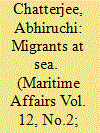

|
|
|
|
|
| Summary/Abstract |
According to the United Nations, the current worldwide displacement is at the highest level ever recorded. Further, the humanitarian crises unfolding in the Mediterranean and the Bay of Bengal have focused the spotlight on the maritime domain as a prominent escape route. They have also raised many questions pertaining to human security and the humanitarian obligations of the states at one end of the spectrum and national security considerations that come with such mass arrivals on the other. However, the two crises have elicited varying responses by the affected state and non-state actors, who have interpreted international law and state obligations differently. This paper seeks to understand and analyse maritime and policy responses to the Syrians in the Mediterranean and the Rohingyas in the Bay of Bengal and Andaman Sea to identify the best practices for states to comply with their international humanitarian obligations while taking state security imperatives into consideration.
|
|
|
|
|
|
|
|
|
|
|
|
|
|
|
|
| 12 |
ID:
163783
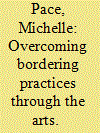

|
|
|
|
|
| Summary/Abstract |
During 2014, Denmark received nearly 15,000 asylum seekers, almost twice the number from the previous year as more people fleeing Syria’s war fled to Europe. By 2016, Denmark succeeded in making the country highly unattractive as a destination for refugees fleeing war torn countries. The country introduced a controversial ‘jewellery bill’, placed adverts in a newspaper in Lebanon dissuading refugees from contemplating a trip to Denmark, and cut assistance benefits for refugees by half. These state bordering practices aimed at securing some kind of ‘Danishness’. This article aims at ascribing agency to young Syrian refugees in Denmark, who have experienced these bordering practices and who seek to counter these practices by participating in meaningful social interactions with their Danish counterparts. The empirical focus is an artistic enactment–a weeklong dance workshop that brought these youngsters together as a distinct form of practice that brings about the conditions of possibility for meaningful integration. Conceptually, it draws upon Arendt’s theory of action and notion of ‘plurality’ to frame how such encounters come about.
|
|
|
|
|
|
|
|
|
|
|
|
|
|
|
|
| 13 |
ID:
180013
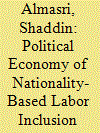

|
|
|
|
|
| Summary/Abstract |
In a setting of protracted refugee crises, donor responses increasingly have taken on experimental development approaches. One such aid experiment is that of the Jordan Compact, drafted in February 2016. This aimed to turn the Syrian refugee crisis in Jordan into a development opportunity, by fostering job creation and harvesting skills of displaced populations. This brought with it attention from donors in the form of political interest and, more importantly, funding, to stimulate the local economy and labor markets. However, the implementation of this plan was problematic: It focused only on stimulating jobs for Syrians and Jordanians, with little attention given to existing labor market dynamics and other employed nationality groups. Using a qualitative approach informed by both desk research and key informant interviews, this article shows that the policies undertaken have formed a nationality-based prioritization strategy that sought to improve Syrian labor market access over that of other non-Jordanians. The Compact did little to address genuine job creation or social protection, focusing on boosting permit numbers while worsening non-Syrian migrant and refugee access to protection in formal work.
|
|
|
|
|
|
|
|
|
|
|
|
|
|
|
|
| 14 |
ID:
171103
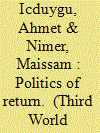

|
|
|
|
|
| Summary/Abstract |
Although the Syrian conflict continues, local and global stakeholders have already begun to consider the return of the six million refugees, especially as neither the option of local integration in the countries of first asylum nor that of resettlement to third countries is seen as a realistic possibility. Elaborating on the return debates in Turkey, Lebanon and Jordan, we relate the politicisation of this question to the growing acceptance of the option of voluntary and involuntary repatriation in the international refugee regime as well as to policies and public opinion. We argue, based on empirical fieldwork, that any debate about the return of Syrian refugees is problematic, since the conditions of safety, voluntariness and sustainability are not fulfilled. Further, returns should not be left entirely to the individual hosting states and actors in the region but should be carried out in collaboration with representative authorities in Syria and the mediation of international organisations upon full resolution of conflict.
|
|
|
|
|
|
|
|
|
|
|
|
|
|
|
|
| 15 |
ID:
172429
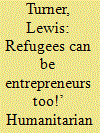

|
|
|
|
|
| Summary/Abstract |
In the context of a greater focus on the politics of migration, the ‘refugee entrepreneur’ has become an increasingly important figure in humanitarian, media, and academic portrayals of refugees. Through a focus on Jordan's Za‘tari refugee camp, which has been deemed a showcase for refugees’ ‘entrepreneurship’, this article argues that the designation of Syrian refugees as ‘entrepreneurs’ is a positioning of Syrians within colonial hierarchies of race that pervade humanitarian work. For many humanitarian workers in Jordan, Syrians' ‘entrepreneurship’ distinguishes them from ‘African’ refugees, who are imagined as passive, impoverished, and dependent on humanitarian largesse. Without explicit racial comparisons, humanitarian agencies simultaneously market Syrian refugees online as ‘entrepreneurs’, to enable them to be perceived as closer to whiteness, and to thereby render them more acceptable to Western audiences and donors, who are imagined as white. This article extends scholarly understandings of the understudied relationship between race and humanitarianism. Furthermore, it asks critical questions about the political work and effects of vision of the ‘refugee entrepreneur’, which it locates within the context of the increasingly neoliberalised refugee regime. ‘Refugee entrepreneurs’ do not need political support and solidarity, but to be allowed to embrace the forces of free-market capitalism.
|
|
|
|
|
|
|
|
|
|
|
|
|
|
|
|
| 16 |
ID:
162408
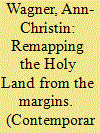

|
|
|
|
|
| Summary/Abstract |
Mafraq, a Jordanian border town, has been profoundly reshaped by the influx of Syrian refugees since 2011. As aid agencies were initially absent from the humanitarian response, the gap was filled by faith-based organisations. In an academic and policy environment narrowly focused on security issues, Islamic charities have received considerable attention. However, little is known about the activities of Evangelical groups, let alone Arab Evangelicals, and how giving aid becomes embedded in wider religiopolitical projects. This article explores how the Mafraq Unity Church, an indigenous Evangelical congregation, balances its religious identity with an increasingly professionalised NGO ‘business’. Drawing on fourteen months of ethnographic fieldwork in 2016/17, I argue that through tapping into resources from secular and non-secular transnational networks, the church appeals to two ‘international communities’: the aid industry and Evangelical communities worldwide. The church's rootedness in northern Jordan speaks to the humanitarian sector's recent ‘localization of aid’ agenda, while its benevolent activities are also framed as part of worldwide Evangelism. This allows Jordanian church officials to rhetorically shift Evangelism's centre of gravity to the Global South and move Mafraq closer to the demographic and historical centre of Christianity.
|
|
|
|
|
|
|
|
|
|
|
|
|
|
|
|
| 17 |
ID:
190752
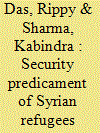

|
|
|
|
|
| Summary/Abstract |
War has numerous repercussions for each gender. In the instances of war-induced displacement, both genders are usually subject to intensive risks in their journey as refugees, from reaching destined countries through dangerous routes to gender differences and inequalities they face in the host countries. The tales of agony and calamity shed light on the fact that the refugee crisis is very much a crisis for both genders not limited to one gender. Since the Second World War, the Middle East has been regarded as the world’s most conflict-prone region. Continuous Wars and civil wars have always raised questions about human threats and Syria is not exceptional. As a consequence of the Syrian civil war which was started in 2011, 13.5 million Syrians substituting for more than half of Syria’s population are deracinated, destitute or confined in difficult to access areas. Tens of thousands of Syrians have fled their nation in search of safety and access to essential amenities. Many Syrians choose to reach Europe other than Middle East countries as their destination to get asylum where they risk their lives by making the dangerous journey through the Mediterranean Sea route and both men and women face different refugee predicaments throughout their journey. At the same time, the European Union (EU) is playing a significant role in managing the Syrian Crisis, although it has been facing a remarkable advent of refugees and migrants. In 2015, the EU and Turkey officially followed a joint ‘Action Plan’, which mainly aimed to deter the gargantuan influx of outcasts and transients into the EU. However, the plan has faced a lot of criticism which argued that although the EU presented as a humanitarian actor in dealing refugee crisis, it is trying to push its responsibilities towards Turkey. Against this backdrop, this article has examined the crisis faced by the Syrian refugees after the adoption of the joint action plan. Further, it has analysed, if the said joint action plan has made their refugee journey more complicated in the EU by adding new challenges for both Syrian men and women differently.
|
|
|
|
|
|
|
|
|
|
|
|
|
|
|
|
| 18 |
ID:
184325
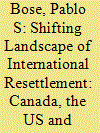

|
|
|
|
|
| Summary/Abstract |
The world is today in the grip of the worst forced migration crisis since the end of the Second World War, with tens of millions driven from their homes by conflict. Yet the global system meant to provide protection to the displaced continues to privilege the interests of nation-states rather than those of refugees and has resulted in less willingness by many countries to accept refugees for resettlement. The arrival – actual or potential – of large numbers of refugees and asylum seekers continues to spur a backlash against them, fuelled by fears of security threats, economic costs, and a lack of integration of newcomers. This situation has combined with xenophobia, racism, and broader cultural anxieties and led to a rising tide of nativist populism and even less welcome for those seeking sanctuary. Whereas by the late 1990 s the dominant logic governing refugee protections – at least in name if not in practice – was centred on multilateralism and humanitarian obligations, today there is a more explicit prominence of national interests in refugee policies. In this paper I argue that the continued dominance of nation-state centric priorities is indicative of the fragility of the global refugee regime. I use the example of Canadian and US responses to the Syrian refugee crisis and interviews with officials in each country to illustrate the primacy of national interests rather than international agreements and norms. The US chose to limit and eventually bar most Syrians from resettlement whereas Canada chose to accept a large number over a short period of time. I argue that both cases reveal similar patterns and logics, if not outcomes and an increasing alignment between border controls and immigration policy. I consider what this means for the future of refugee resettlement in North America and for the global refugee regime more broadly.
|
|
|
|
|
|
|
|
|
|
|
|
|
|
|
|
| 19 |
ID:
175516
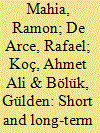

|
|
|
|
|
| Summary/Abstract |
This article presents the results of a simulation on the short-, medium- and long-term aggregated economic contribution of Syrian refugees on the Turkish economy. The simulation is focused on two sources of impact: refugees’ access to the Turkish labor market and the investment flow generated by Syrians inside the country. An input–output approach is used to compute economic effects considering the intersectoral linkages of the Turkish economy, thereby expanding the focus of a classic impact study. Our results show a positive economic impact of Syrian refugees of around 2 percent of GDP in the short term and 4 percent in the long term. Syrian immigration in Turkey is becoming a factor of economic dynamism that not only benefits the Syrian community itself but also the Turkish host communities. The direct and indirect contribution in terms of production and demand is very relevant and, properly channeled and promoted, can become a relative advantage for the country and not a burden of care.
|
|
|
|
|
|
|
|
|
|
|
|
|
|
|
|
| 20 |
ID:
193280
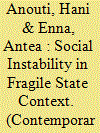

|
|
|
|
|
| Summary/Abstract |
Lebanon has always been an unstable and challenging country. With or without refugees, politics in Lebanon is subject to different internal, regional, and international dynamics that affect the country’s fragile political, security, economic, and social stability. To better understand social instability in Lebanon, this article sheds light on the role of Syrian refugees in diminishing or otherwise of Lebanon’s political, security, and social stability. Taking into consideration the historical role of refugees—especially Syrians—in affecting social stability and the whole political system in an already fragile and almost failed state, the article will also rely on the existing literature on the relationships and interactions between host communities and refugees. This contribution will rely on a qualitative approach to explore the relations and drivers of tensions between Lebanese host communities and the Syrian refugees, highlighting the differences in perceptions and the main sources of strains. In particular, the article will investigate the policies and aid schemes of the international community, mainly United Nations organizations and international nongovernmental organizations, in fostering or otherwise of the tension between the Lebanese host community and the Syrian refugees.
|
|
|
|
|
|
|
|
|
|
|
|
|
|
|
|
|
|
|
|
|